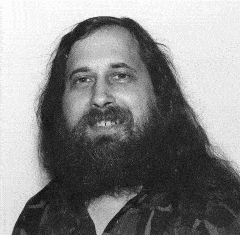|
“The hacker ethic refers to the feelings of right and wrong, to the ethical ideas this community of people had — that knowledge should be shared with other people who can benefit from it, and that important resources should be utilized rather than wasted.” – Richard Stallman, MEME 2.04, 1996. |
The last of the true hackers, Richard Matthew Stallman was born in New York City in 1953. He joined the group of hackers at the MIT Artificial Intelligence Laboratory (AI Lab) in 1971.
In 1984, Stallman started the influential GNU project to develop a free operating system called GNU. GNU is compatible with Unix, and the name GNU stands for “GNU’s Not Unix”, to emphasize that it is like Unix but not Unix. Today millions of people use a version of GNU, though often referring to it as Linux, which is actually the name of the operating system kernel, published under the GNU General Public License (as are many of the other software packages usually distributed with the Linux kernel).
Stallman resigned from the MIT AI Lab to start GNU, so that MIT would not be able to claim the copyright on the GNU software, but the university was kind enough to let him use their computers. In 1985, Stallman founded the Free Software Foundation as a tax-exempt charity for development of free software. Interestingly, much of the FSF funding comes from the sale of CDROM’s containing copies of the FSF software.
Most GNU software is distributed under the GNU General Public License (GPL), sometimes called a copyleft. The GNU GPL enables others to copy, distribute, and make changes to software, as long as they don’t prevent others from doing the same thing. This well thought out legal license has been incorporated in a wide range of software from operating systems to games by people all over the world.
Stallman calls the idea inherent in the GNU GPL “free software” since it protects crucial freedoms for all users of the code. Note that “free software” does not mean “zero price” — in fact, every user has the right to sell a copy of a free software package. The GNU license requires three main things: that the source code must be published, that the code may be changed by others, and that either the original or modified code may be redistributed under the same conditions. This important idea has helped popularize several related movements, including the shareware and free open source software movements. However, Stallman does not support the “open source” movement because it because it does not support the philosophical foundations of the free software movement, mainly the requirement that modifications to open source licensed software don’t have to be automatically subject to the same underlying license.
The idea that information should be free is fundamental to many other movements, such as Project Gutenberg, which distributes free soft-copy of books, and the user maintained free encyclopedia Wikipedia. This Living Internet site is also in that tradition, freely available for personal use to anyone with access to the net.
Stallman has also developed the GNU EMACS text editor, GNU symbolic debugger (GDB), and GNU C compiler.
Awards. Stallman has received the following awards and distinctions:
- 1991 — Grace Hopper Award from the Association for Computing Machinery, for development of the first Emacs editor in the 1970s.
- 1990 — MacArthur Foundation fellowship, and $240,000 genius grant
- 1996 — Honorary doctorate from the Royal Institute of Technology, Sweden.
- 1998 — Electronic Frontier Foundation’s Pioneer award, shared with Linus Torvalds
- 1999 — Yuri Rubinski Award.
- 2001 — Honorary doctorate from the University of Glasgow.
- 2001 — Takeda Award for Social/Economic Betterment, shared with Torvalds and Ken Sakamura.
- 2002 — Elected to the US National Academy of Engineering.
